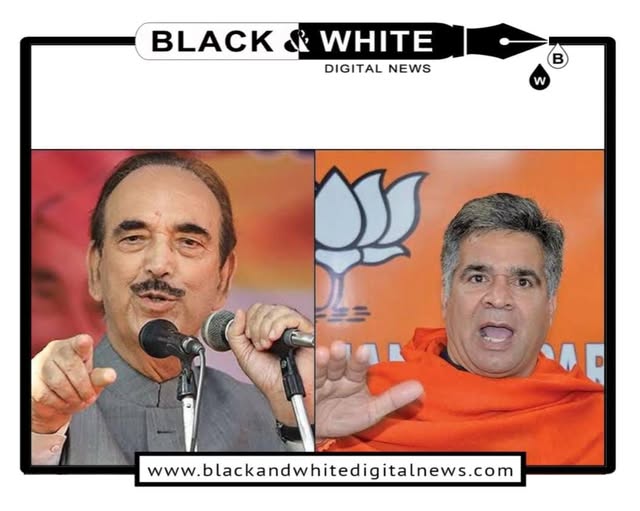Fate of Ghulam Nabi Azad and Ravinder Raina’s Government Accommodation Awaits Decision: High Court to Review Status Report on May 27
PIL over Eviction of Overstaying Ex-Ministers and Legislators Moves Ahead Amid Ongoing Legal Scrutiny
||Black and White Digital News ||
||Parvinder Singh April 28,2025 ||
In a significant development in the high-profile Public Interest Litigation (PIL No. 17/2020) concerning the eviction of former ministers and legislators who continue to occupy government accommodations beyond their entitlement, the Estates Department has submitted a fresh status report before the High Court of Jammu & Kashmir and Ladakh.
The latest status report, dated April 21, 2025, has been filed pursuant to the Division Bench’s direction issued on March 26, 2025. The Bench, then comprising Chief Justice Tashi Rabstan (since retired) and Justice M.A. Chowdhary, is overseeing this litigation that has had wide-ranging political and legal implications in the Union Territory.
Current Status of Azad and Raina:
The Estates Department, in its report filed through Senior Additional Advocate General (Sr. AAG) S.S. Nanda, disclosed that the cases of two prominent politicians — Ghulam Nabi Azad, former Chief Minister of J&K, and Ravinder Raina, former President of BJP J&K — were placed before a Designated Committee in its meeting held on February 28, 2025. The Committee was tasked with making appropriate recommendations on whether the two leaders should continue to occupy government residential accommodations.
Subsequently, the minutes of the Committee’s deliberations have been forwarded to the “Competent Authority” for final decision-making, and the outcome is currently awaited. This procedural step is crucial, as the fate of Azad and Raina hinges on the authority’s determination.
The PIL was originally filed to address the issue of politicians and ex-legislators overstaying in government housing, a matter that raised serious questions about privilege, fairness, and administrative accountability. Over the course of proceedings, nearly 200 political figures, including high-profile names such as former Chief Ministers Mehbooba Mufti and Omar Abdullah, and former ministers like Harsh Dev Singh, Kavinder Gupta, Sat Sharma, Bali Bhagat, Sukhnandan Choudhary, and Priya Sethi, have been evicted following the Court’s consistent push for compliance with the law.
Dispute on Closure of PIL:
At the last hearing on March 26, 2025, Sr. AAG Nanda suggested that the PIL could be closed as the government had successfully retrieved most of the accommodations. However, Advocate S.S. Ahmed, representing the petitioner, strongly opposed this move. He highlighted that while many politicians had been evicted, figures like Azad and Raina continued to occupy government residences, thereby creating a situation of “two sets of laws” in a single Union Territory.
Ahmed referenced a significant prior order dated December 26, 2022, wherein the Division Bench had dismissed an application by former MP Ch. Lal Singh, emphasizing that security assessments and entitlement to government accommodations are separate issues. The Court had then imposed a fine of ₹25,000 on Ch. Lal Singh, underlining its commitment to ensuring that legal processes are not circumvented under the pretext of security needs.
Acknowledging Ahmed’s submissions, the Court had recorded that the Designated Committee would review the cases of Azad and Raina within three weeks. The matter is now slated for the next hearing on May 27, 2025, when the High Court is expected to examine the latest status report filed by the Estates Department and possibly take a call on the closure or continuation of the PIL depending on the decision of the Competent Authority.
Legal and Political Implications:
This case holds broader implications for governance norms in Jammu and Kashmir. It underscores judicial efforts to dismantle entrenched privileges enjoyed by political elites, promoting the rule of law and equitable treatment. The final decision on Azad and Raina will be keenly watched, not only for its immediate impact but also for its symbolic value in signaling administrative transparency and judicial oversight in post-reorganization J&K.



